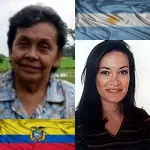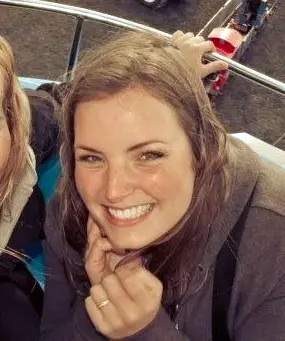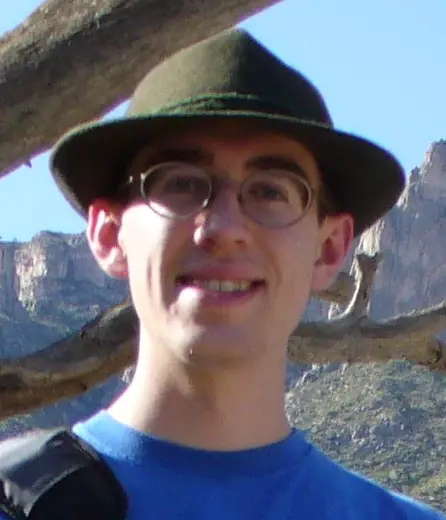Guy Gambill is the author of many dictionaries available on Freelang. Who is he? How does he proceed when he makes a dictionary and what are his motivations? Ladies and Gentlemen, please give a round of applause to Mr Guy Gambill. 🙂
Interview by Beaumont
Published May 7, 2004
Guy, can you introduce yourself in a few words: where do you live, how old are you, what is your occupation…?
I currently reside in Minneapolis, Minnesota. I am 43 years of age and I work in the Radiology Department of a hospital in the Metropolitan area.
You contributed to Freelang with 12 dictionaries: BASQUE, MANX, CORNISH, BOLIVIAN QUECHUA and OJIBWE in November 2003, then NAHUATL and MOHAWK (in January 2004), then ABENAKI-PENOBSCOT, GOTHIC and ZULU in March, and eventually BLACKFOOT and CHEYENNE a few days ago. I’m sure the first question everybody would want to ask you is: do you speak all of these languages? If not, what languages do you actually speak?
What languages do I speak? I speak Spanish, German, and English well and I possess a good working knowledge of several other Romance languages. I have studied the Celtic languages from the standpoint of a historical linguist and understand well their importance within the broader Indo-European family of languages.
How do you select the languages you work on, is it because you are specially interested in the language, is it because you noticed there was no free dictionary available on the web?
I began with a desire to assist in language preservation, to use the web as a vehicle for the promotion of minority language study and conservation. I have decided to focus, primarily, on the Algic family of languages for now–thus, the Blackfoot, Cheyenne, Ojibwe, and Abenaki files. I have had assistance with each of the Algic dictionaries and am very grateful for the help that I have had. I am currently working very hard to learn the Ojibwe language and have made a great deal of progress… it is a wonderfully complex and rich language. As for the Gothic, I studied Germanic languages at University and spent long hours on Wright’s grammar of Bishop Wulfilas’s translation of the New Testament. Basque… one of the most fascinating languages (and fascinating peoples) on the planet. I have studied the Basque culture for many years and continue to be intrigued by them and the Basque language.
Among the 12 dictionaries, many are devoted to Native American languages: OJIBWE, MOHAWK, ABENAKI-PENOBSCOT, BLACKFOOT and CHEYENNE. Why are you specially attracted by these languages, and is it only about languages?
I am deeply interested in the Algic family of languages for many reasons: I am from Minnesota, I owe a debt of gratitude to a very kind Ojibwe man who once helped me, I hate to see any language die, and I love languages in general… each represents a distinct vision of the world. The AmerIndian view of life is deeply spiritual in a way which it is hard for the European mind to fathom, but its richness is-for me-beyond doubt. I also noticed, as you mention, the lack of good free dictionaries on the net.
As for Ojibwe, it is perhaps the most complex language on the face of the earth… what better challenge for one interested in languages and linguistics? No, it is not only about languages, it is about the people, about distant ancestors. Again, Native Americans possess a deeply spiritual view of life which moves me deeply.
Tell us more about GOTHIC. I reckon it’s the only extinct language in the dictionaries you have made?
Gothic is the oldest attested Germanic language. For those unfamiliar with the term, “attested” means written down or recorded. Our primary source for the Gothic language is, as I mentioned previously, a 4th century translation of the New Testament into the Gothic tongue by a cleric named Wufilas. As stated, I studied the Gothic language in my youth and make use of my knowledge of it in my studies of comparative IE linguistics (now a primary hobby of mine).
What about MANX and CORNISH, do you fear they will become extinct languages as well?
Technically, Manx and Cornish are already extinct. The last native speaker of Manx, Ned Maddrell (I hope I recall the name correctly) died in the 1960s, I believe. The last native speaker of Cornish died in the latter part of the 18th century. Since then, however, both languages have been revived, to a degree, by interested parties on the Isle of Man and in Cornwall. In the case of Manx we are fortunate enough to have many hours of recordings made by Mr. Maddrell before he died so we know exactly how the language sounded. In the case of Cornish we are not so fortunate.
There are many languages in Africa, why did you pick up ZULU in particular?
Strangely, there are not all that many large resources for African languages on the internet. There are large databases for Swahili and Hausa and many files, as well, on languages belonging to the Niger-Congo family. A great site for these is CBOLD (Comparative Bantu Online Database) which holds many dictionary and lexical files. I picked Zulu purely for the reason that I find the Zulu people fascinating… especially the classic conflict which occured between Great Britian and the Zulus during the 19th Century. Truly, I am hoping more people will participate in building files for Freelang. I thought that the more files that appear, the more people will come to the site. Out of an increased number of visitors I hope some -better qualified than I- will choose to produce more African Language files.
How do you actually proceed when you write a dictionary, what kind of sources do you use?
I try to pick languages that do not have wide internet representation. For many languages the sources are very limited. I begin by assembling all the data that I can find: from libraries, from native speakers, the internet, ordering books, etcetera. In the case of Native American languages I purchase books and connect with a Native speaker and work from there. Currently, I have files on over 2700 languages, in various data formats, on my computer. I probably own 250 hard-copy books and an equal number of journals and magazines. I start building files… I send them to Native speakers to review. Sometimes -as in the case of Ojibwe- I might write and re-write a file as many as 7-8 times. In the case of the Native American dictionaries (my primary focus now) I will never be “done” with any of them. I will continue to add, edit and improve.
How do you select the words, do you proceed by alphabetical order, or do you have a list of words sorted by frequency of use?
It depends. As stated, many times the languages I choose have a limited amount of data which I can access. This is true in the case of Cheyenne, Abenaki, Blackfoot and Ojibwe in particular. Ojibwe has many more sources than the others, however. I gather all that I can then enter alphabetically.
I think you worked in collaboration with other people for some dictionaries. Can you tell us more about these people and how you work together?
For languages which I had little knowledge of I sought out those who possessed greater knowledge than I -this is particularly true of the Native American languages. I would say I did the “grunt” work: i.e., I slogged through endless hours of assembling files, selecting entries and just plain doing data-entry. I would send the rough drafts to others who would edit and return the files with suggested corrections. Then I would re-edit… again and again, in some cases… to the point of near madness :). I had the good fortune to find several people who have had the good grace, patience and knowledge to teach me a great deal. My special thanks go out to several people, in particular Weshki-ayaad and Kees van Kolmeschaate. Thanks to their help and patience, I have learned how to approach the Algic languages. I cannot thank them enough! They are selfless, dedicated and possessed of great integrity in their work and have all made enormous contributions to the study of Native languages… purely out of a love of languages and of people.
Among the dictionaries you have made, what is the one you are the most proud of and why?
Definitely the Ojibwe dictionary… though this shall soon be equalled by the Cheyenne dictionary. I worked very, very hard on the Ojibwe file and learned much. I also have an aforementioned gratitude to the Ojibwe people. I am working very hard now to make the Cheyenne dictionary a great resource… and also to improve the Ojibwe version over time.
Apart from making dictionaries, what are your hobbies?
I love to travel, read history and philosophy, study archeaology and historical linguistics. I also like to dance, engage in a variety of water-sports, ski -on occasion- and hang out with my son.
Do you like travelling, have you travelled a lot?
I love to travel. Yes, I have travelled a great deal: Africa, Europe, South and Central America, the Carribean, and the US and Canada. I have lived for long periods in Mexico, Spain and Germany.
When you surf the web, what are your favorite websites?
Obviously, I’m fond of Freelang :). I also like the Human languages page, CBOLD, Voice of the shuttle, Project Athena, TITUS, Project Gutenberg, ABZU, Zuzu’s Petals, Starling, and many others.
Do you remember your first visit on Freelang’s website? What made you think you would like to contribute to the project and add your own dictionaries?
It was the only site I could find where all of the dictionaries were ‘on-site’… no dead links to other sites, no hyperlinks which led you through page after page until you finally found the file you wanted… I wanted to contribute in some way and Freelang seemed like the best bet on the www. It still is! If more people would get involved, get out of the realm of “theory” and into action, it could be a great world-resource… it’s going to be anyway if I have anything to say about it 🙂 … it will just take longer without more participants.
What do you like about Freelang, and what don’t you like and think should be improved?
I like the fact that it is very user-friendly, it is attractive on the desktop and easily manipulated for editing. Furthermore, it is free, multi-national in scope and promotes a coming together of people… and not a driving of wedges between them. You can use audio, and various font types with relative ease. It is also a small program. What should be improved? There should be more non-western font support (non-Latin, that is). I would love to see support for languages which use the Arabic script(s), for example. A large Arabic file would be outstanding! I hope someone can take it on. I think that there needs to be an additional column for the entry of grammatical markers, cross-entry searching also. Explanatory notes would be good-i.e., improvement of the help file. Introductory descriptions on the languages would be cool: number of speakers, where spoken, short description, bit of history, basic grammatical comments… an expansion of entry size would also be a welcome addition.
Have you received some feedback from the people who downloaded your dictionaries?
Yes, I have received many letters. Some critical, but most thankful. I welcome any and all feedback and any assistance people might offer. I love it when people ask for my help… that is one of the main reasons I started doing it in the first place.
Is there something you like to say to the people who use your dictionaries? Do you need help, do you need more comments from them?
Again, I welcome any comments people care to make. If people would like to get involved or assist in some way… bring ’em on! I could sure use help! Right now I have too much to enter alone. If someone wishes to do entry, just write and we can work on it together.
What about your projects, are you currently working on updates or new dictionaries?
I am working on Ojibwe always… and on Cheyenne. I am now also engaged in producing Maliseet, Yurok and Naskapi versions. I have a number of other files in varying stages of completion. Maliseet and Naskapi should appear soon. I also have a friend who is working on a Pottawatomi dictionary which should also be ready soon. She is also assisting with an Ojibwe update -adding grammatical markers.
If you had a wish to make for the future?
Love to win the Lotto (hahaha)… maybe meet Miss Right someday. :). No, but really, I would like to do nothing but work on languages and language promotion… but it shall probably remain a passion which is picked up in my spare time, unfortunately.
Thank you very much, Guy! 🙂
Some links recommended by Guy Gambill:
- CBOLD (Comparative Bantu On-line Data-Base)
- Voice of the Shuttle (humanities research)
- Titus (linguistics)
- Project Gutenberg (free electronic books)
- Athena project (e-texts)
- ABZU (study of the Ancient Near East)
- Starling (linguistic families)
- The Rosetta Project (language archive)
- Human languages page (language-related Internet resources)
- Ethnologue (information about languages)
- First Ojibwe (Ojibwe language and culture)
![]() Feel free to share your comments on this interview.
Feel free to share your comments on this interview.



